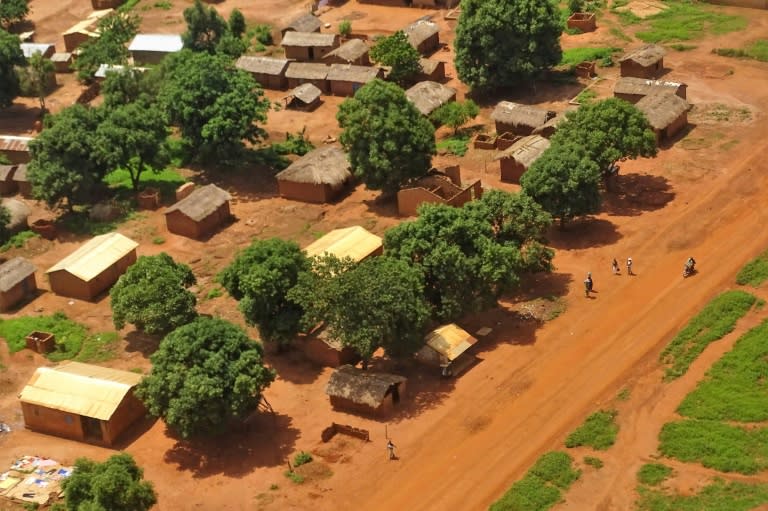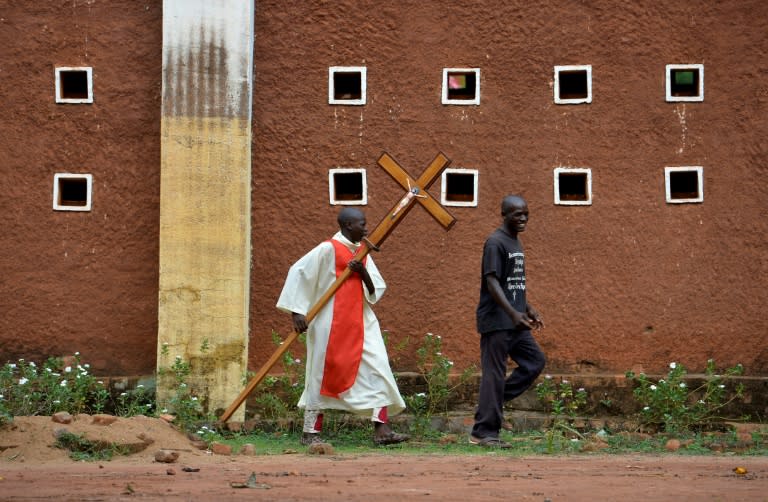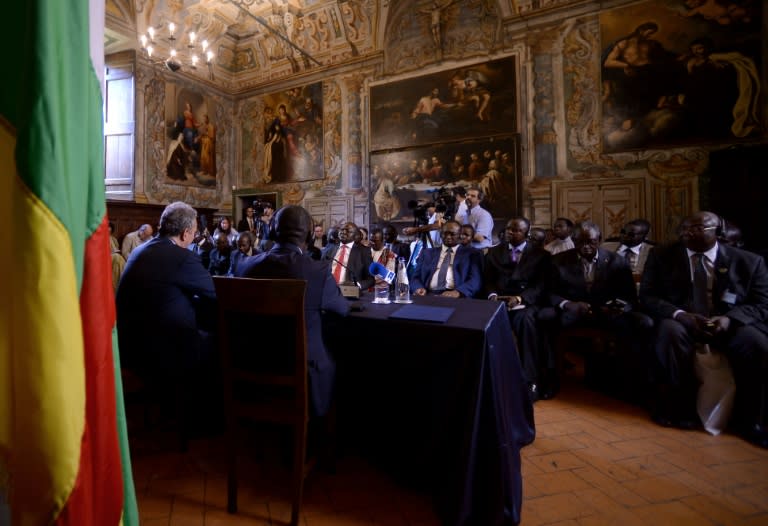Around 100 killed in C. Africa after truce deal
The death toll from clashes in Central African Republic has surged to around 100, local officials said Wednesday of violence that erupted hours after the government signed a truce with rebel groups. The bloodshed, which left dozens more injured, dashed hopes of an end to the simmering sectarian violence which has blighted the country since 2013. Although the unrest has long pitted Christian anti-Balaka militias against mainly Muslim ex-Seleka rebels, there have been growing splits within the various armed groups that have turned deadly. Shooting erupted early on Tuesday in the central town of Bria and continued for about six hours, leaving around 100 people dead, according to the town's mayor Maurice Belikoussou and its parish priest. "We have counted around a hundred deaths, the population is terrified and showing signs of psychosis," Father Gildas Gbenai of Saint-Louis de Bria told AFP by phone. "The humanitarian situation is alarming." The fighting began just hours after Bangui reached a deal with rebel groups on an immediate ceasefire in an agreement brokered by a Catholic group in Rome. - Engulfed by violence - "The warring parties burned villages and neighbourhoods of Bria, forcing more of the population out with many fleeing into the bush," local MP Arsene Kongbo told AFP on Wednesday. As the shooting intensified, the UN's MINUSCA peacekeeping mission, which has a permanent presence in Bria, moved in to try and protect civilians, spokesman Vladimir Monteiro said. The peacekeepers managed to "secure the camp for internally displaced people" as well as the area by the hospital, he said. MINUSCA has 10,000 troops and 2,000 civilians currently serving in the country. Since mid-May, Bria and several other southeastern towns -- Bangassou, Alindao and Mobaye -- have been engulfed by violence. By the end of the month, the fighting had already killed 300 people, and displaced 100,000 others, according to the UN and government. In Bria alone, the violence has forced more than 40,000 people out of their homes, figures from the UN humanitarian agency OCHA show. - Power struggle between rebels - Tuesday's clashes saw deadly fighting between rival factions of the FPRC, one of the main pro-Muslim armed groups, with gunmen battling in the streets of Bria, a strategic mining hub in a diamond-rich region. "There was a 'slight' disagreement between the FPRC's leaders," said a senior member of the group, describing it as a power struggle. "Each one wants to assert his power." The fighting pitted one faction of the FPRC that is closer to the anti-Balaka militias against a rival gang which is closer to the Muslim branch of the group as espoused by Abdoulaye Hissene, the ex Seleka coalition's former chief. After the Seleka group was forced out of Bangui in 2014, it split into several factions which have since turned on each other, some joining forces with anti-Balaka groups. Monday's short-lived agreement, which was announced after five days of talks in Rome, had been hailed as a precious chance to stabilise one of the world's most volatile and poorest countries. Under the deal, which was signed by 13 of the 14 rebel factions in CAR, armed groups were to be granted political representation in exchange for an end to attacks and blockades. But just hours later, intense shooting began with dozens taken to hospital with bullet wounds, a Doctors Without Borders (MSF) representative in Bria said. - Nobel for failed peace? - "The crisis in Central Africa doesn't lack for peace deals, what it does lack is the forces to ensure such deals are respected," Thierry Vircoulon, a researcher at the French Institute for International Relations (IFRI), told AFP on Monday. "If there was a Nobel prize for hopeless peace agreements, Central Africa would definitely win," said Djamil Babanani, spokesman for the FPRC. Although he criticised the "international pressure" brought to bear over the agreement, he said the FPRC would not pull out. The bloodshed prompted urgent calls from the UN for an immediate halt to the violence. "It is vital that the cease-fire agreed upon by the parties comes into force immediately," said Parfait Onanga-Anyanga, the UN's special representative in Central Africa. He said violence across the country since mid-May had displaced more than 100,000 people internally and forced another 20,000 to seek refuge in neighbouring Democratic Republic of Congo. "The total number of internally displaced persons has therefore surpassed the 500,000 mark." One of the world's poorest nations, CAR has been struggling to recover from a 2013 civil war that started when President Francois Bozize was overthrown by a coalition of Muslim-majority rebel groups called the Seleka. Christians, who account for about 80 percent of the population, sought revenge by organising vigilante units dubbed "anti-balaka" in reference to the machetes used by the rebels. In 2014, the Seleka were ousted by a military intervention led by former colonial ruler France, triggering the bloodiest sectarian violence in the country's history.




